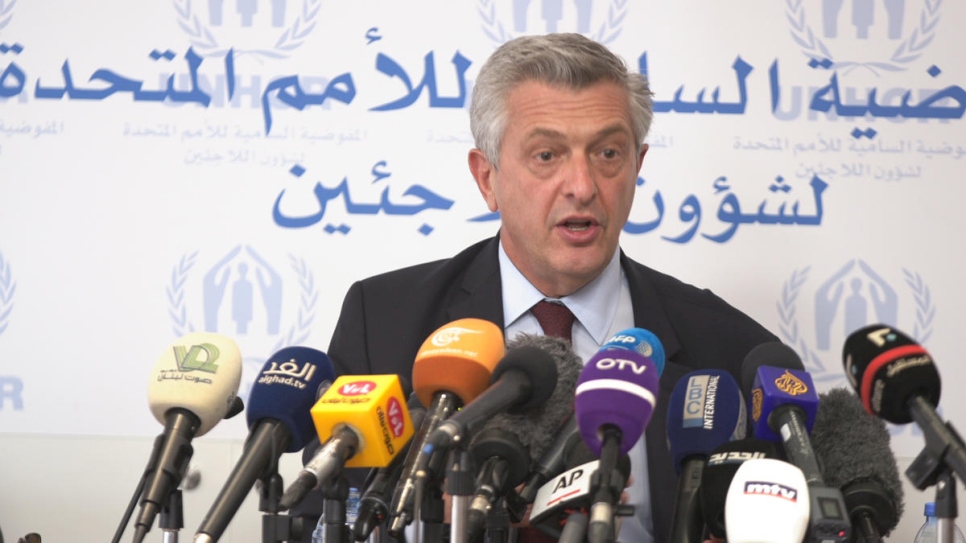UNHCR chief meets Lebanese officials after three-country Syria tour
Filippo Grandi says that factors preventing voluntary refugee return must be addressed, and holds constructive discussions with senior Lebanese officials.

UN High Commissioner for Refugees Filippo Grandi speaks to reporters at a news conference in the Lebanese capital Beirut. © UNHCR
BEIRUT, Lebanon - With the Syrian conflict now in its eighth year, the UN High Commissioner for Refugees Filippo Grandi traveled to Jordan, Syria and Lebanon to assess the acute humanitarian needs of refugees, internally displaced people (IDPs) and host communities. His visit comes as discussions around the possible future repatriation of some 5.6 million refugees in the region have intensified.
Addressing a news conference in Beirut, Grandi said that return is the best solution for refugees but it must be voluntary and sustainable. He added that UNHCR listens to and conveys the concerns of refugees so they can be addressed. These concerns include the lack of infrastructure and services in many areas, fear of retribution or military conscription, legal uncertainty surrounding property or civil documentation, and the evolving security situation in the country.
“For larger numbers of people to decide to go back, it is necessary to build more confidence … by addressing all these issues, and we are making progress on some of them — some are more difficult,” Grandi told reporters. “It is important also that UNHCR — as the United Nations Refugee Agency — plays a role and has a presence, especially in the areas of return.”
Grandi said that return is the best solution for refugees but it must be voluntary and sustainable.
Grandi emphasized that UNHCR is not a political but a humanitarian organization. Its objective is to ensure that refugees receive protection and support in countries hosting them. It also works with concerned governments to find solutions to their plight, including resettlement to a third country or return to their homes, he said.
The High Commissioner was speaking following meetings with senior Lebanese officials including President Michel Aoun and Prime Minister-designate Saad Hariri. Grandi acknowledged the heavy burden carried by Lebanon in hosting more than 976,000 registered Syrian refugees.
Grandi later met with Foreign Minister Gebran Bassil, where the constructive discussion centered on the complex set of factors — legal, administrative and security — that refugees frequently cite as issues hampering their decision to return. They agreed that UNHCR and the government of Lebanon would continue to discuss in a concrete and practical manner issues related to the voluntary return of refugees.
Meanwhile, Lebanon and other host countries in the region will continue to need the support of humanitarian organizations and the international community, Grandi said. He called on donors to continue providing financial assistance to host governments in the region where the vast majority of Syrian refugees are based.
The High Commissioner also expressed his concern over the critical situation facing civilians in the northern Syrian governorate of Idlib, where any future military offensive could potentially result in widespread loss of life and a fresh wave of forced displacement.
He reiterated an appeal by UN Secretary-General António Guterres that any course of action should seek to avoid civilian casualties and prevent a possible humanitarian disaster. He also warned that the outcome of any operation there would influence refugees’ perception of the possibility of a safe return home.
